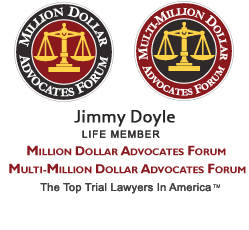Stevens Johnson Syndrome
Stevens Johnson Syndrome (SJS) often develops after use of certain pharmaceutical drugs. Toxic Epidural Necrolysis (TEN) is a more severe form of SJS. Oftentimes, the drug companies play down the risks or fail to warn of the potential risks in order to continue reaping large profits from sales. We are the firm to hold those companies accountable. We continue to accept clients and file claims for those affected by these defective drugs. Let us know if we can help you.
Over the years, the Doyle Law Firm's SJS injury lawyers have helped those affected by the side effects of medication achieve justice for a drug company's failure to warn about side effects they've known about (but failed to issue a warning at the risk of losing profits). We continue to prosecute claims on behalf of those who suffer completely avoidable injuries. The development of Stevens Johnson Syndrome is one of those instances where drug companies could substantially reduce the number of cases - if they would simply issue the proper warnings to potential users. This is usually not an option they choose, because the risk is usually outweighed by the benefit. Of course this would harm their hefty profits by turning off users who would opt for other treatment. So, over and over, patients develop this condition and our SJS lawyers are called into action.

Stevens Johnson Syndrome Symptoms
Symptoms of SJS, also known as TEN, can include flu-like symptoms followed by a painful red or purplish rash that spreads and blisters, eventually causing the top layer of skin to die and shed.
Stevens Johnson Syndrome (SJS) is a rare skin disease, often brought on by medication including COX-2 inhibitors and other non-steroidal anti-inflammatory drugs. Patients suffering from SJS, also known as erythema multiforme major (EM) Leyll’s syndrome or toxic epidermal necrolysis (TEN), often suffer from general symptoms like fever, aching and nausea. From there, symptoms develop to skin rash and irritation, blisters in the nose, mouth, eyes and genitals, and inflamed mucous membranes. Some patients suffer hair and nail loss. In rare cases, SJS can be deadly. Anyone can develop SJS, although the disease is more common in Caucasians. SJS is the severe adverse reaction of skin and mucous membranes to a medication or infection. A rare but serious condition, SJS is often diagnosed as Toxic Epidermal Necrolysis (TEN).
Drugs That Most Commonly Cause SJS
Among the drugs most commonly associated with SJS or TEN are:
- Allopurinol®
- Bactrim® and other sulfa antibiotics
- Carbamazepine (mood stabilizers such as Tegretol®)
- Celebrex® or other Cox-2 inhibitors
- Dilantin® and Phenytoin®
- Ibuprofen (Advil® and Motrin®)
- Nonsteroidal anti-inflammatory drugs (Daypro®, etc.)

What Happens if SJS Goes Untreated?
If SJS/TEN is not treated at its onset, the disorder may lead to a number of extremely serious conditions that can include:
- blindness
- hearing loss
- organ failure
- death
Treatment often involves hospitalization in burn centers or debridement (surgical removal of damaged tissue). Individuals with SJS/TEN can take weeks or even months to recover depending upon the severity of the condition.
Other Drugs Known To Cause SJS
SJS has been linked to a number of drugs, including anitbiotics such as Zithromax/azithromycin; prescription pain relievers such as Celebrex, Bextra, and Daypro; and over-the-counter pain relievers like Motrin/ibuprofen and Children's Advil/Motrin. A complete list of drugs associated with SJS follows:
- Advil / ibuprofen
- Ansaid / flurbiprofen
- Bextra / valdexocib
- Cataflam / diclofenac
- Celebrex / celoxicab
- Children's Advil / Motrin
- Clinoril / sulindac
- Daypro / oxaprozin
- Dolobid / diflunisal
- Feldene / piroxicam
- Indocin / indomethacin
- Lamictal / lamotrigine
- Lodine / etodolac
- Nalfon / fenoprofen
- Mobic / meloxicam
- Motrin / ibuprofen
- Naprosyn / naproxen
- Oruvail / ketoprofen
- Ponstel / mefenamic
- Relafen / nabumetone
- Tolectin / tolmetin
- Septra DS / (all sulpha antibiotics)
- Toradol / ketorolac
- Vioxx / rofecoxib
- Zithromax / azithromycin
In addition, these drugs had recent modifications to the BOXED WARNING, CONTRAINDICATIONS and/or WARNINGS sections:
- Anaprox /Anaprox DS (naproxen sodium tablets)
- Ansaid (flurbiprofen tablets, USP)
- Arthrotec (diclofenac sodium/misoprostol) Tablets
- Cataflam (diclofenac potassium immediate-release tablets)
- Clinoril (sulindac) Tablets
- Daypro (oxaprozin) Caplets
- Daypro Alta (oxaprozin potassium) Tablets
- Depacon (valproate sodium injection)
- Depakene (valproic acid capsules and syrup)
- Depakote (divalproex sodium coated particles in capsules) Sprinkle Capsules
- Dolobid (diflunisal) Tablets
- Elidel (pimcerolimus) Cream 1%
- Feldene (piroxicam) Capsules
- Indocin (indomethacin) Capsules, Oral Suspension, and Suppositories
- Lodine (etodolac capsules and tablets)
- Lodine XL (etodolac extended-release tablets)
- Motrin (ibuprofen) Suspension 100 mg/5 mL
- Motrin (ibuprofen tablets, USP)
- Nalfon (fenoprofen calcium capsules, USP)
- Naprelan (naproxen sodium) Controlled-Release Tablets
- Naprosyn (naproxen tablets), Naprosyn (naproxen suspension), and EC-Naprosyn (naproxen delayed-release tablets
- Nimotop (nimodipine) Capsules For Oral Use
- Orudis (ketoprofen) Capsules and Oruvail (ketoprofen) Extended-Release Capsules)
- Ponstel (mefenamic acid capsules, USP)
- Protopic (tacrolimus) Ointment, 0.03% and 0.1%
- Relafen (nabumetone) Tablets
- Voltaren (diclofenac sodium enteric-coated tablets)
- Voltaren-XR (diclofenac sodium extended-release tablets)
- Parnate (tranylcypromine sulfate tablets)
- Aleve (220 mg naproxen sodium) Tablets
- Aleve Cold & Sinus (220 mg naproxen sodium and 120 mg pseudoephedrine HCl)
- Extended Release Tablets
- Aleve Sinus & Headache (220 mg naproxen sodium and 120 mg pseudoephedrine HCl) Extended Release Tablets
- Carbatrol (carbamazepine) Extended-Release Capsules
- Children's ElixSure IB (100 mg/5 mL ibuprofen) Suspension
- Junior Strength Advil (100 mg ibuprofen) Tablets
- Effexor (venlafaxine hydrochloride) Tablets
- Effexor XR (venlafaxine hydrochloride) Extended-Release Capsules
- Midol Extended Relief (220 mg naproxen sodium) Tablets
Contact An Alabama SJS Injury Law Firm
If you or a loved one experienced drug-induced SJS/TEN, contact our Alabama SJS injury lawyers. You may have a defective product claim against a pharmaceutical company who failed to warn you and your doctor about the harmful side effects. Call our Birmingham, Alabama, offices today for a free consultation. Our office number is 205.533.9500. Do not wait another day and risk losing your claim.
The attorneys at the Doyle Law Firm continue to accept SJS and TEN clients and we will continue to file lawsuits nationwide. If your injury qualifies, you may be able to recover damages (monetary compensation) for your pain, suffering, and medical treatment expenses. The Doyle Law Firm's experienced injury trial lawyers have extensive experience with product liability claims, specifically those involving defective and dangerous drugs.
Stevens Johnson Syndrome Lawsuits
The SJS side effect lawyers at the Doyle Law Firm, PC have a proven track record of success in helping our clients obtain compensation for injuries resulting from the use of dangerous medications.
Our experienced team of legal professionals and SJS injury attorneys have been helping dangerous drug injury victims for years. We are dedicated to achieving real justice for the clients we serve can assure them that we will work diligently to achieve a satisfactory result.
Alabama Stevens Johnson Syndrome Statute of Limitations
Alabama has a two year statute of limitations on filing certain product liability and personal injury claims. It takes time to acquire medical records and draft pleadings, so please do not delay in contacting us if you have any concern that your SJS or TEN injury may have been caused by a dangerous drug.




 Fosamax, Boniva, Actonel, Aredia, and Zometa - medication prescribed to treat osteoporosis - are linked to femur fractures after 3 years of use. If you took any of this medication (or any combination thereof) and suffered a femur fracture,
Fosamax, Boniva, Actonel, Aredia, and Zometa - medication prescribed to treat osteoporosis - are linked to femur fractures after 3 years of use. If you took any of this medication (or any combination thereof) and suffered a femur fracture,  Mesh used during surgery to repair the vaginal wall has caused women to experience mesh erosion into the vagina, prolapse, pain during intercourse, incontinence, bowel or bladder perforation, bleeding and serious infection. We're now accepting clients with claims against AMS, Bard, Boston Scientific, Ethicon, and Johnson & Johnson. If you took have suffered any of these side effects,
Mesh used during surgery to repair the vaginal wall has caused women to experience mesh erosion into the vagina, prolapse, pain during intercourse, incontinence, bowel or bladder perforation, bleeding and serious infection. We're now accepting clients with claims against AMS, Bard, Boston Scientific, Ethicon, and Johnson & Johnson. If you took have suffered any of these side effects,  A growing number of metal-on-metal artificial hip implants are being recalled due to early failures and some patients suffering from metallosis - metal debris released from the hip compontents inflame the surrounding tissue and enter the bloodstream, causing elevated levels of cobalt and chromium. We're now accepting clients with claims aginst Biomet, DePuy, Stryker, Smith & Nephew, Wright, and Zimmer. If you have (or had) one of these devices, we can help to protect your legal rights. To contact us,
A growing number of metal-on-metal artificial hip implants are being recalled due to early failures and some patients suffering from metallosis - metal debris released from the hip compontents inflame the surrounding tissue and enter the bloodstream, causing elevated levels of cobalt and chromium. We're now accepting clients with claims aginst Biomet, DePuy, Stryker, Smith & Nephew, Wright, and Zimmer. If you have (or had) one of these devices, we can help to protect your legal rights. To contact us, 